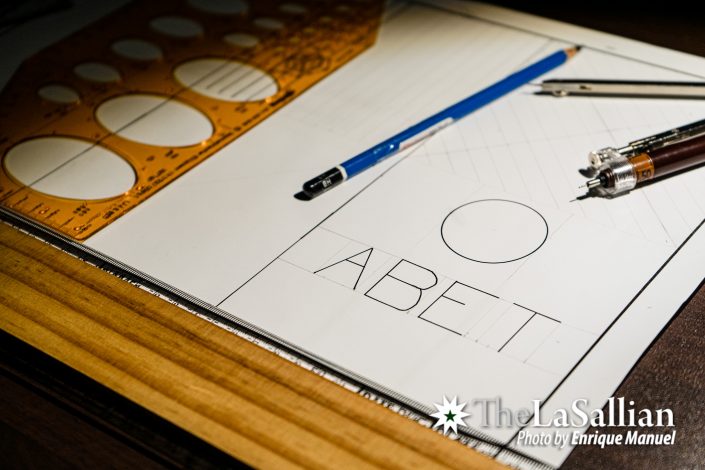Announced last September 11, DLSU now boasts an official certification from the Accreditation Board for Engineering and Technology, Inc. (ABET) for all seven of the University’s undergraduate Gokongwei College of Engineering (GCOE) programs: Civil Engineering, Chemical Engineering, Computer Engineering, Electronics Engineering, Industrial Engineering, Manufacturing Engineering and Management, and Mechanical Engineering.
This accreditation by ABET—a non-profit and non-governmental organization that accredits tertiary programs under the fields of Science, Technology, Engineering, and Mathematics—primarily allows for the “mutual recognition” of the University’s Engineering programs in certain countries, according to the GCOE Assistant Dean for Quality Assurance Dr. Rosemary Seva.
‘For the benefit of the students’
Seva discloses that the University’s road to accreditation started in 2013 when she was still the Dean of GCOE; back then, the college had yet to have any international certifications or recognition, despite other Philippine universities such as AMA University and Mapua University already enjoying ABET’s approval.
Weighing possible benefits the said certification could bring to the University, Seva states that one of their key motivators in pursuing the ABET accreditation process was to increase the likelihood of their students getting accepted for jobs abroad.
Yet even with the University’s current state, the international scene continues to put Lasallian engineers at a global disadvantage. “I think until now, our Engineering graduates [still do not get] hired in some countries as ‘engineers’,” Seva laments.
Seva notes that, before the additional two years took effect last 2012 in the revamped K-12 educational curriculum of the Philippines, the number of years students spent studying in the country posed problems, especially for those who wanted to apply abroad. She expounds that several other countries often require students to have spent at least 16 years attaining a formal education.
This conflicts with students studying in the Philippines, who only received 14 years of education, from kindergarten to fourth year college. Because of the two-year difference, according to Seva, a licensed Philippine engineer would not be recognized as a fully-fledged engineer, instead only earning the title of “engineering technician” abroad. At that time, it seemed the ABET accreditation was the University’s one shot at giving their students a chance at having equal opportunities abroad and become at par with the standards of other degrees globally.
“The Council of Chairs decided that we have to go for [the] ABET accreditation because [it is] for the benefit of the students,” she affirms.

Dealing with obstacles
“There [were] a lot of requirements,” stresses incumbent GCOE Dean Dr. Jonathan Dungca, who explains that there was a need for the college to modify certain parts of their curriculum.
One major change was the restructuring of the Engineering curriculum to emphasize “outcome-based education”, a pedagogical approach that requires students to not only learn certain principles theoretically, but also practically apply those skills through projects and other outputs. Dungca says it was “fairly easy” to adopt the said framework, as it was both in line with ABET’s standards and with the learning outcomes being prescribed by the Commission on Higher Education (CHED).
Further, Seva mentions that initiating the restructuring of the said curriculum proved to be difficult; some faculty members did not initially support or believe in the endeavor, deeming the ABET accreditation process too “time-consuming” and “expensive”, without really “[adding] value”.
“All faculty members of the college were required to attend training that would help them in the [ABET accreditation] process…Each department identified its educational objectives after consultation with the stakeholders,” she elaborates.
The costs incurred in the process of attaining ABET certification were also something the GCOE administration had to fully commit to—and thankfully, as Dungca mentions, they were able to obtain support and approval from the “top administrators” of the University. Among these expenses were certain computer software and equipment used in laboratories and other facilities.
Additionally, the University had to shell out more than P6-million for their accreditor’s visitation alone, discloses Seva. She further remarks, “Compared to the other accreditation bodies, [ABET’s process was] definitely the most expensive.”
Maintaining the standard
With the University being ABET-accredited, Dungca mentions that the bar has now been set much higher, with GCOE expecting to produce much better Engineering graduates who are competitive globally.
Dungca notes that the ABET certification is a “continuous quality improvement” venture for the college, emphasizing, “This is not a one-time [thing] and then you’ll get it. It has to be maintained.” With this in mind, he hopes to continue garnering the support of the University’s “top administrators” in GCOE’s “continuous seeking of quality education.”
“ABET is like a stamp of quality,” Seva outlines. Her sentiments align with Dungca’s in that the University’s successful quest to acquire accreditation has raised expectations for Lasallian Engineering students.
Seva furthers, “We are very proud of the accreditation because it’s not easy. It’s not just about paying money—it’s about creating a quality culture within the college.”
